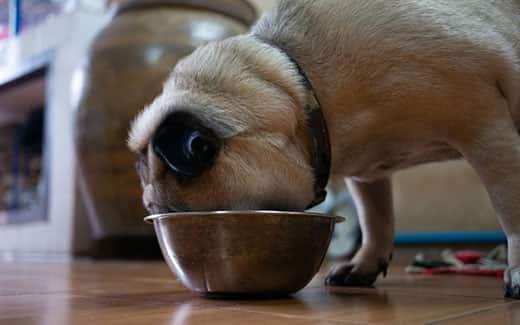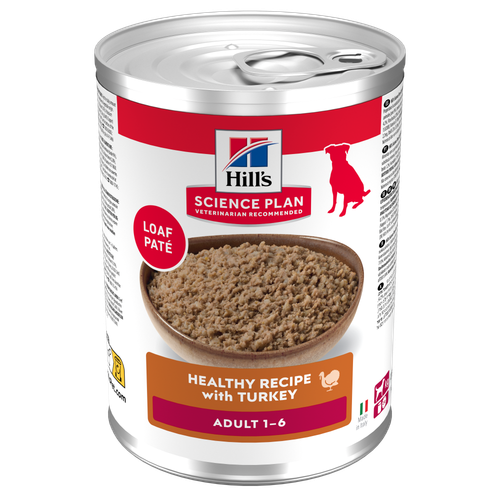
-
Find the right food for your petTake this quiz to see which food may be the best for your furry friend.Find the right food for your petTake this quiz to see which food may be the best for your furry friend.Featured products
 Perfect Digestion Large Breed Puppy Food
Perfect Digestion Large Breed Puppy FoodPrecisely balanced nutrition with Hill's ActivBiome+ prebiotic blend actively contributes to supporting digestive health and overall wellbeing to help your pet feel their best
Shop Now Adult Light Dog Food
Adult Light Dog FoodHill's Science Plan Light Adult Wet Dog Food is a complete premium pet food for adult dogs that tend to gain weight easily. This deliciously smooth loaf is formulated to deliver the appropriate amount of energy to support weight maintenance in adult dogs.
Shop Now Large Breed Adult Dog Food
Large Breed Adult Dog FoodHill's Science Plan Large Breed Adult Dog Food with Lamb & Rice is a complete pet food, specially formulated with ActivBiome+ Multi-Benefit Technology.
This food is specifically designed to fuel the energy needs of large breed dogs during the prime of their life.Shop NowFeatured products Sterilised Adult Cat Food
Sterilised Adult Cat FoodHill's Science Plan Adult Sterilised Cat Dry Food with Salmon is specially formulated with ActivBiome+ Multi-Benefit Technology. It is a precisely balanced nutrition, tailored to meet the needs of sterilised cats, to help keep sthem lean & healthy.
Shop Now CULINARY CREATIONS ADULT CAT FOOD
CULINARY CREATIONS ADULT CAT FOODHill's Science Plan CULINARY CREATIONS Adult cat food with Salmon & Carrots was formulated to provide a great-tasting experience to cats. Its delicious flavour and texture are combine with essential nutrients to support cats' optimal health during the prime time of their life. Specially formulated with high-quality salmon protein, essential taurine for heart health & balanced minerals to support kidneys & bladder.
Shop Now Adult Cat Food
Adult Cat FoodHill's Science Plan Adult Cat Food with Chicken is a complete pet food, specially formulated with ActivBiome+ Multi-Benefit Technology.
This food is specially formulated to fuel the energy needs of cats during the prime of their life.Shop Now -
Dog
- Dog Tips & Articles
-
Health Category
- Weight
- Food & Environmental Sensitivities
- Urinary
- Digestive
- Joint
- Kidney
Featured articles Pet Nutrition: What Makes "Healthy" Pet Food Healthy? | Hill's Pet
Pet Nutrition: What Makes "Healthy" Pet Food Healthy? | Hill's PetIn people, the right diet is very important. If you are eating the wrong way for your metabolism, activity level, age and lifestyle you could end up with health issues.
Read More Microchipping: The Facts | Hill's Pet
Microchipping: The Facts | Hill's PetThe government has announced that as of April 2016, all dogs in the UK must be microchipped by law.
Read More The Incredible Science Behind Your Pet's Microbiome
The Incredible Science Behind Your Pet's MicrobiomeLearn what your pet's microbiome is, how it contributes to your pet's gut and overall health, and why nutrition is important in maintaining healthy microbiomes.
Read More -


There are a million jokes that can be made about dog farting, but if you have a pet who is an excessive farter, the smell or sound might be wreaking havoc on your personal life. Plus, in some instances, the answer behind what makes dogs fart such foul-smelling gas could be that their health needs attention. Smelly wind may be the butt of many jokes, if you’ll pardon the pun, but if it’s not normal for your dog or it’s accompanied by sickness, diarrhoea or weird things like yellow poop, it might not be such a laughing matter.
Or, on the other hand, your dog might just be a super-farter who doesn't mind stinking you out. Hey, we all have our special talents; this just might be theirs.
If you've ever noticed that your dog farts a lot, or have had to deal with the embarrassment of it happening when you have guests over, then this guide is for you. Here's how you can determine what may be causing the noxious smells and whether or not the gas warrants a prompt visit to the veterinarian.
What Makes Dogs Fart?
There are many reasons why your dog may be extra flatulent. Some common reasons include changing their food, gastrointestinal illness and nutritional disturbances, such as a food intolerance.
Another cause can be the type, quality and quantity of ingredients in your dog's food as they influence the amount of gas formed in the intestine. When bacteria in the colon ferment fibre or poorly digested proteins and carbohydrates, gas is produced. Pet food containing certain oligosaccharides (found in ingredients such as soybeans, beans, chickpeas and lentils) tend to produce large amounts of gas in the intestine.
However, there are other, less common, reasons your dog might be stink-bombing your family. Does your pooch eat too fast? The American Kennel Club (AKC) reports, "It is widely believed that aerophagia, or increased swallowing of air, can lead to gas in dogs. Greedy eaters that wolf down their food and brachycephalic breeds are at an increased risk of swallowing more air than normal, which can lead to gas down the line, so to speak."
But, Seriously. My Dog Farts A LOT.
Passing gas is as normal for dogs as it is for humans. However, it's important to pay attention if you're noticing a significant increase in your dog's flatulence.
What you may view as "too many farts" could be an indication that your pet is experiencing gastrointestinal issues. Additionally, farting could be a sign of intestinal parasites or problems with the pancreas, says the AKC.
Any major change in a pet, even if it seems as silly as farting, warrants a trip to the veterinarian to ensure they aren't experiencing a serious problem. If gas is accompanied by poor appetite, diarrhoea, vomiting, weight loss or behaviour changes, it's definitely a good idea to give your vet a call.


Tasty Tips
How to Stop the Farting
If you think your dog farts a lot and are wondering how to reduce it to a more appropriate amount — you're in luck. If your veterinarian is able to help you identify the cause of the excess gas, you might be able to reduce some of the farting. For example, if you feed your dog cheese as a treat, but your veterinarian determines your pet is sensitive to dairy, simply eliminating it from their meal plan can drastically decrease their flatulence.
Just as you can't control another human's gas passing, you can't completely control your pet's either, but what they eat could offer your nose a little relief. Dog foods that contain high levels of protein or poorly digestible protein sources often produce more odorous farts. Ingredients such as broccoli, cabbage, cauliflower and brussels sprouts can also be fermented and produce sulphur containing gases that lead to smelly farts.
Importance of Nutrition and Its Role in a Dog's Flatulence
Speaking of what your dog eats, their everyday nutrition plays a huge role in their digestive health that, in turn, affects how much gas they might be passing. Intestinal bacteria can ferment undigested proteins and produce sulphur-containing gases. With that, a properly balanced dog food with the right nutrients can help promote healthier digestion. Be sure to ask your veterinarian to recommend a healthy dog food. Additionally, for dogs that have been diagnosed with a disease that causes poor digestion or malabsorption of nutrients, these conditions may be associated with bloating and flatulence. For these dogs, veterinarians can recommend dog foods specially formulated to support the dog's GI tract health. Be sure to ask your veterinarian if one of these therapeutic pet foods is a good option.
Now that you know what makes dogs fart, you can hopefully put an end to — at least some of — the stink bombs in your house! Take a closer look at your dog’s food and see if there is anything that might be putting their digestive system out of whack. And remember, a quick visit to the vet can always help you determine how to proceed in the best interest of your pet's health.


Erin Ollila believes in the power of words and how a message can inform—and even transform—its intended audience. Her writing can be found all over the internet and in print, and includes interviews, ghostwriting, blog posts, and creative nonfiction. Erin is a geek for SEO and all things social media. She graduated from Fairfield University with an M.F.A. in Creative Writing. Reach out to her on Twitter @ReinventingErin or learn more about her at http://erinollila.com.
Related products

Hill's Science Plan Adult Wet Dog Food with Turkey is a complete premium pet food for adult dogs from 1 year. This deliciously smooth minced turkey loaf is formulated to deliver the appropriate amount of energy to support the needs of adult dogs.

Precisely balanced nutrition with Hill's ActivBiome+ prebiotic blend actively contributes to supporting digestive health and overall wellbeing to help your pet feel their best

Hill's Science Plan Large Breed Adult Dog Food with Lamb & Rice is a complete pet food, specially formulated with ActivBiome+ Multi-Benefit Technology.
This food is specifically designed to fuel the energy needs of large breed dogs during the prime of their life.

Hill's Science Plan Light Adult Wet Dog Food is a complete premium pet food for adult dogs that tend to gain weight easily. This deliciously smooth loaf is formulated to deliver the appropriate amount of energy to support weight maintenance in adult dogs.
Related articles

Dog obesity is a significant problem - learn more about helping your dog become trimmer and healthier through improved nutrition.
Discover the causes, signs, and treatments of kidney disease in dogs and find methods of supporting your dog's kidney health. Learn more at Hill's Pet.

Learn to see the signs of an upset stomach in your dog, understand the triggers and explore some possible solutions.

Gurgling tummies in turmoil are not good news for pets. Owners who have to clean up the unfortunate consequences, digestive problems are one of the rare downsides to owning a pet.

Put your dog on a diet without them knowing
Our low calorie formula helps you control your dog's weight. It's packed with high-quality protein for building lean muscles, and made with purposeful ingredients for a flavourful, nutritious meal. Clinically proven antioxidants, Vitamin C+E, help promote a healthy immune system.
Put your dog on a diet without them knowing
Our low calorie formula helps you control your dog's weight. It's packed with high-quality protein for building lean muscles, and made with purposeful ingredients for a flavourful, nutritious meal. Clinically proven antioxidants, Vitamin C+E, help promote a healthy immune system.

